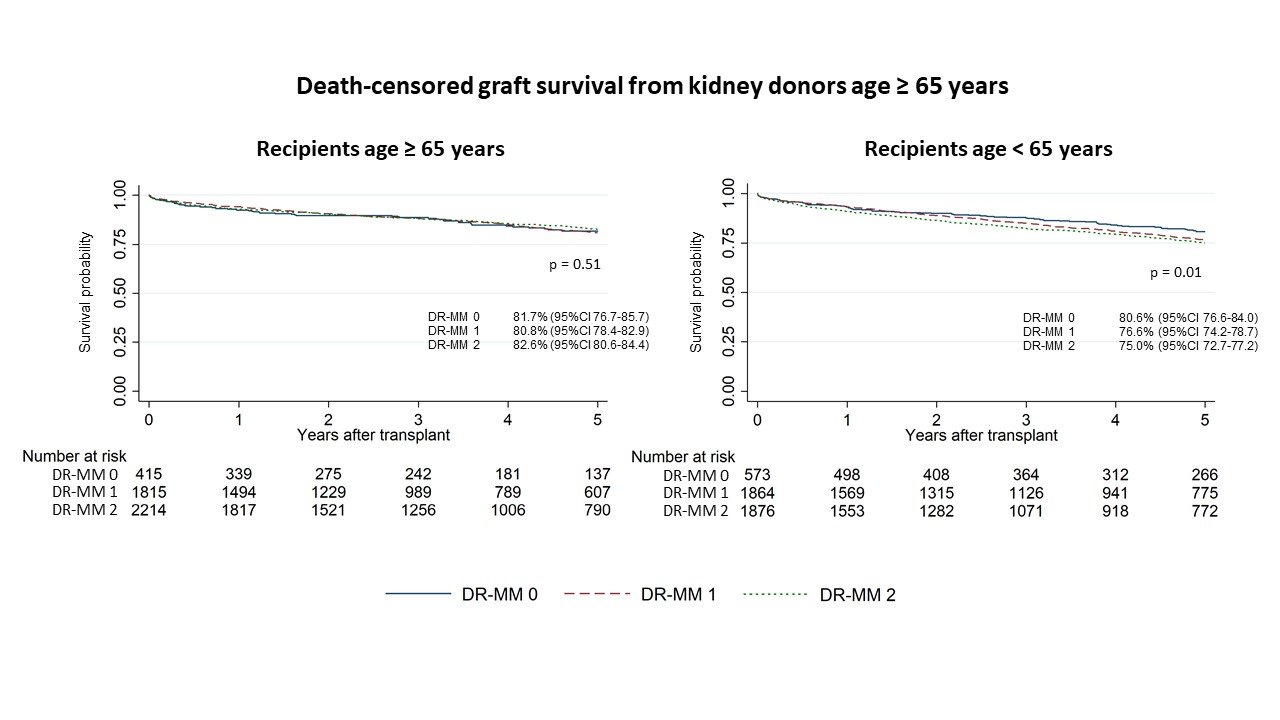Effect of HLA-DR Mismatches on Graft Outcomes of Kidney Transplant from Elderly Donors
David Geffen School of Medicine at UCLA, Los Angeles, CA
Meeting: 2021 American Transplant Congress
Abstract number: 830
Keywords: Elderly patients, Graft survival, HLA-DR antigens, Rejection
Topic: Clinical Science » Kidney » Kidney Deceased Donor Allocation
Session Information
Session Name: Kidney Deceased Donor Allocation
Session Type: Poster Abstract
Session Date & Time: None. Available on demand.
Location: Virtual
*Purpose: Human leukocyte antigen (HLA)-DR has been shown to be more immunogenic than HLA-A or -B. The impact of HLA-DR mismatches remains unclear among kidney transplant from elderly donors. Here we report the effect of HLA-DR mismatches on graft rejection and graft survival among these patients.
*Methods: The OPTN/UNOS data of kidneys from donors aged ≥65 years, transplanted between 2000-2018 were included. Study populations were grouped into recipients aged ≥65 years (old-old) and recipients aged <65 years (old-young).
*Results: A total of 8,826 KTXs were included, which 50.7% were old-old. There were 26.5% and 24.9% living donor transplant in old-old and old-young groups, respectively. The median follow-up time was 5 years (IQR 2.2-8.8). KTXs with 0, 1 and 2 HLA-DR mismatches were 9.3%, 40.8% and 49.9% of old-old group, and 13.2%, 43.2% and 43.6% of old-young group, respectively. There were lower rejection rates in old-old group with 0, 1 and 2 HLA-DR mismatches which were 8.7%, 11.3% and 13.0% compared to old-young group which were 12.2%, 14.9% and 14.8%, respectively. Univariate analysis and multivariate analysis including recipient age, HLA-A and -B mismatches, panel reactive antibody, previous transplant, cold ischemic time, and delayed graft function showed that HLA-DR mismatch was associated with an increased risk for rejection (HR 1.13; 95%CI 1.04-1.23 and aHR 1.12; 95%CI 1.02-1.17 per each degree of mismatch). In old-old group, there were no differences in 5-year death-censored graft survivals (DCGSs) which were 81.7%, 80.8% and 82.6% when HLA-DR mismatches = 0, 1 and 2, respectively (p=0.51). In old-young group, there were statistically significant lower 5-year DCGSs when HLA-DR mismatches = 0, 1 and 2 which were 80.6%, 76.6% and 75.0%, respectively (p=0.01).
*Conclusions: HLA-DR mismatches in KTX from elderly donors had no significant effect on DCGSs if transplant into older recipients but associated with statistically significant lower DCGSs if transplant into younger recipients. HLA-DR mismatches were an independent risk factor for graft rejection in both elderly and younger recipients. Comparing within each degree of HLA-DR mismatch, older recipients had better DCGS and lower rejection rates than younger recipients.
To cite this abstract in AMA style:
Homkrailas P, Bunnapradist S. Effect of HLA-DR Mismatches on Graft Outcomes of Kidney Transplant from Elderly Donors [abstract]. Am J Transplant. 2021; 21 (suppl 3). https://atcmeetingabstracts.com/abstract/effect-of-hla-dr-mismatches-on-graft-outcomes-of-kidney-transplant-from-elderly-donors/. Accessed February 19, 2026.« Back to 2021 American Transplant Congress

